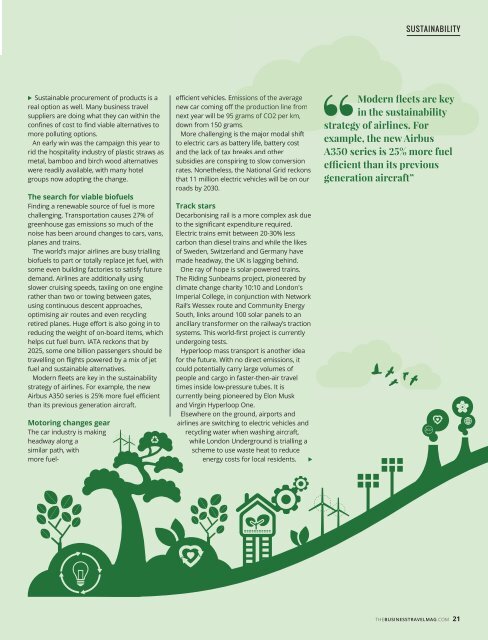You also want an ePaper? Increase the reach of your titles
YUMPU automatically turns print PDFs into web optimized ePapers that Google loves.
SUSTAINABILITY<br />
Sustainable procurement of products is a<br />
real option as well. Many business travel<br />
suppliers are doing what they can within the<br />
confines of cost to find viable alternatives to<br />
more polluting options.<br />
An early win was the campaign this year to<br />
rid the hospitality industry of plastic straws as<br />
metal, bamboo and birch wood alternatives<br />
were readily available, with many hotel<br />
groups now adopting the change.<br />
<strong>The</strong> search for viable biofuels<br />
Finding a renewable source of fuel is more<br />
challenging. Transportation causes 27% of<br />
greenhouse gas emissions so much of the<br />
noise has been around changes to cars, vans,<br />
planes and trains.<br />
<strong>The</strong> world’s major airlines are busy trialling<br />
biofuels to part or totally replace jet fuel, with<br />
some even building factories to satisfy future<br />
demand. Airlines are additionally using<br />
slower cruising speeds, taxiing on one engine<br />
rather than two or towing between gates,<br />
using continuous descent approaches,<br />
optimising air routes and even recycling<br />
retired planes. Huge effort is also going in to<br />
reducing the weight of on-board items, which<br />
helps cut fuel burn. IATA reckons that by<br />
2025, some one billion passengers should be<br />
travelling on flights powered by a mix of jet<br />
fuel and sustainable alternatives.<br />
Modern fleets are key in the sustainability<br />
strategy of airlines. For example, the new<br />
Airbus A350 series is 25% more fuel efficient<br />
than its previous generation aircraft.<br />
Motoring changes gear<br />
<strong>The</strong> car industry is making<br />
headway along a<br />
similar path, with<br />
more fuel-<br />
efficient vehicles. Emissions of the average<br />
new car coming off the production line from<br />
next year will be 95 grams of CO2 per km,<br />
down from 150 grams.<br />
More challenging is the major modal shift<br />
to electric cars as battery life, battery cost<br />
and the lack of tax breaks and other<br />
subsidies are conspiring to slow conversion<br />
rates. Nonetheless, the National Grid reckons<br />
that 11 million electric vehicles will be on our<br />
roads by 2030.<br />
Track stars<br />
Decarbonising rail is a more complex ask due<br />
to the significant expenditure required.<br />
Electric trains emit between 20-30% less<br />
carbon than diesel trains and while the likes<br />
of Sweden, Switzerland and Germany have<br />
made headway, the UK is lagging behind.<br />
One ray of hope is solar-powered trains.<br />
<strong>The</strong> Riding Sunbeams project, pioneered by<br />
climate change charity 10:10 and London's<br />
Imperial College, in conjunction with Network<br />
Rail’s Wessex route and Community Energy<br />
South, links around 100 solar panels to an<br />
ancillary transformer on the railway’s traction<br />
systems. This world-first project is currently<br />
undergoing tests.<br />
Hyperloop mass transport is another idea<br />
for the future. With no direct emissions, it<br />
could potentially carry large volumes of<br />
people and cargo in faster-then-air travel<br />
times inside low-pressure tubes. It is<br />
currently being pioneered by Elon Musk<br />
and Virgin Hyperloop One.<br />
Elsewhere on the ground, airports and<br />
airlines are switching to electric vehicles and<br />
recycling water when washing aircraft,<br />
while London Underground is trialling a<br />
scheme to use waste heat to reduce<br />
energy costs for local residents. <br />
Modern fleets are key<br />
in the sustainability<br />
strategy of airlines. For<br />
example, the new Airbus<br />
A350 series is 25% more fuel<br />
efficient than its previous<br />
generation aircraft”<br />
THEBUSINESSTRAVELMAG.COM<br />
21

















